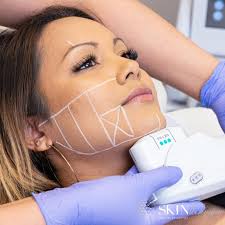FaceTone
The treatment is an office-based non-invasive procedure that generates deep tissue stimulation resulting in rejuvenation and skin tightening in facial and neck areas.
A Safe, Clinically Proven, Fast Treatment
Using a unique 1470nm laser-powered handpiece to heat the mid-dermal layers of the skin, the procedure stimulates the skin’s natural collagen production and improves tone and texture for smoother and healthier skin.
What FaceTone Treats
- Skin Toning
- Fine Lines & Wrinkles
- Skin Rejuvenation
FACETONE RESULTS
With a legacy of 10,000+ happy clients and 500+ glowing five-star reviews, Sskin Savvy Advanced Aesthetics has established itself as a leader in luxury dermatology and aesthetics. Discover why we’re the trusted choice for those seeking exceptional results.
have a question?
Quick answers to questions you may have
What is the primary mechanism of action of Facetone?
Facetone is a non-invasive treatment that uses controlled thermal energy to stimulate skin rejuvenation. By delivering heat deep into the skin layers, it promotes collagen remodeling, improves skin texture, and enhances overall skin quality—resulting in a firmer, more youthful appearance.
What are the key indications for using Facetone?
Facetone is primarily indicated for: • Fine lines and wrinkles
• Skin rejuvenation
• Anti-aging treatments
• Improvement in skin texture and tone
It is an excellent option for patients seeking visible results without surgery or downtime.
What are the common side effects patients might experience with Facetone? Facetone is well tolerated.
However, some patients may experience mild, temporary side effects, including:
• Slight redness
• Tingling or warmth
• Mild skin irritation
Are there any contraindications or precautions I should be aware of before prescribing Facetone?
Facetone is considered very safe with no downtime. While no special precautions are typically required, it is always advisable to:
• Avoid the procedure on open wounds, active infections, or inflamed skin
• Ensure the patient is not pregnant or has any photosensitive conditions
• Conduct a basic skin assessment prior to treatment for maximum safety and efficacy.
